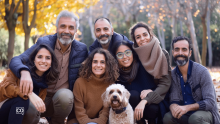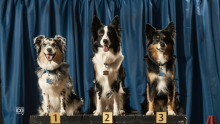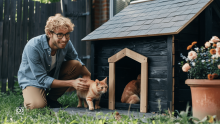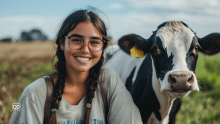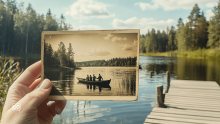10K+ students - 4.8/5
Spanish course (syllabus)
Spanish learning plan and audio, exercises, grammar and vocabulary materials for usage during our conversation lessons.
-
Structured by CEFR level
Practical and fun
6 learning modules per level
Level
A1 A2| Chapter | Learning goals | Lesson materials | Actions |
|---|---|---|---|
|
A1:1
Saludos y despedidas
(Greetings and Farewells)
Learning module 1 (A1):
Presentarse
(To introduce oneself)
|
|
A1.1.1 Diálogo: Ana y Pedro se presentan A1.1.2 Cuento corto: Los saludos de Juan |
Share Copied! |
|
A1.2.1 Diálogo: Pedro y Ana se encuentran de nuevo A1.2.2 Cuento corto: Pedro se presenta en clase |
Share Copied! | |
|
A1:3
¿De dónde eres?
(Where are you from?)
Learning module 1 (A1):
Presentarse
(To introduce oneself)
|
|
A1.3.1 Diálogo: Ana y Pedro hablan de sus raíces A1.3.2 Cuento corto: Los orígines de Stefan A1.3.3 Cultura: España y sus regiones |
Share Copied! |
|
A1:4
Números y contar
(Numbers and counting)
Learning module 1 (A1):
Presentarse
(To introduce oneself)
|
|
A1.4.1 Cuento corto: Practicando matemáticas A1.4.2 Cultura: Los números en el Juego de La Oca A1.4.3 Gramática: Números cardinales: básicos A1.4.4 Gramática: Números cardinales: centenas, miles, millones |
Share Copied! |
|
A1.5.1 Diálogo: La familia de Eva A1.5.2 Cuento corto: La familia de Juan |
Share Copied! | |
|
A1.6.1 Diálogo: Hablar sobre el cumpleaños A1.6.2 Cuento corto: El cumpleaños de Ana A1.6.3 Cultura: Tradiciones de cumpleaños en España A1.6.4 Gramática: Palabras interrogativas: ("cuánto" y "cuándo") |
Share Copied! | |
|
A1:7
Profesiones y estudios
(Professions and studies)
Learning module 1 (A1):
Presentarse
(To introduce oneself)
|
|
A1.7.1 Diálogo: Conversación sobre el trabajo y los estudios A1.7.2 Cuento corto: Sueños de estudiante A1.7.3 Cultura: Estudios Universitarios en España A1.7.4 Gramática: Palabras interrogativas: "dónde, cuál, qué" |
Share Copied! |
|
A1:8
Dirección y datos de contacto.
(Address and contact details.)
Learning module 1 (A1):
Presentarse
(To introduce oneself)
|
|
A1.8.1 Diálogo: ¿Me das tu contacto? A1.8.2 Cuento corto: Crear una cuenta personal A1.8.3 Gramática: Presente de indicativo: los verbos regulares |
Share Copied! |
|
A1:9
Días de la semana y partes del día.
(Days of the week and parts of the day)
Learning module 2 (A1):
De horas a estaciones
(From hours to seasons)
|
|
A1.9.1 Diálogo: ¿Cuándo nos vemos? A1.9.2 Cuento corto: Una semana en la vida de Eva |
Share Copied! |
|
A1:10
El clima y el tiempo
(The weather)
Learning module 2 (A1):
De horas a estaciones
(From hours to seasons)
|
|
A1.10.1 Diálogo: Un día soleado, lluvioso, y un posible arcoíris A1.10.2 Cuento corto: ¡El Tiempo Loco de Nuestro Pueblo! |
Share Copied! |
|
A1:11
Números ordinales
(Ordinal numbers)
Learning module 2 (A1):
De horas a estaciones
(From hours to seasons)
|
|
A1.11.1 Diálogo: ¿En qué piso vives? |
Share Copied! |
|
A1:12
Estaciones, meses y partes del año.
(Seasons, months and parts of the year)
Learning module 2 (A1):
De horas a estaciones
(From hours to seasons)
|
|
A1.12.1 Diálogo: Las estaciones favoritas de Ana y Pedro A1.12.2 Cuento corto: Viajamos con Ana en cada estación del año A1.12.3 Cultura: Sintiendo las estaciones a través de la música |
Share Copied! |
|
A1:13
Decir la hora y leer el reloj.
(Telling the time and reading the clock)
Learning module 2 (A1):
De horas a estaciones
(From hours to seasons)
|
|
A1.13.1 Diálogo: ¿Qué hora es? A1.13.2 Cuento corto: Cada minuto cuenta |
Share Copied! |
|
A1:14
Fechas del calendario y días festivos.
(Calendar dates and holidays)
Learning module 2 (A1):
De horas a estaciones
(From hours to seasons)
|
|
A1.14.1 Diálogo: Planificando las fiestas navideñas con Pedro y Ana A1.14.2 Cuento corto: Un año de celebraciones con Pedro |
Share Copied! |
|
A1.15.1 Diálogo: ¿Qué desayunas cada día? A1.15.2 Cuento corto: Un día de comida saludable |
Share Copied! | |
|
A1.16.1 Diálogo: Las rutinas diarias A1.16.2 Cuento corto: Ana se prepara para una entrevista de trabajo |
Share Copied! | |
|
A1.17.1 Diálogo: Ingredientes para un gazpacho andaluz A1.17.2 Cuento corto: Receta para una tarta de queso casera A1.17.3 Cultura: Las tapas españolas A1.17.4 Gramática: Obligaciones - "hay que, tener que, deber" |
Share Copied! | |
|
Share Copied! | ||
|
A1.19.1 Diálogo: Pagar en el mercado |
Share Copied! | |
|
A1.20.1 Diálogo: La compra en el mercado A1.20.2 Cuento corto: Marta en el supermercado |
Share Copied! | |
|
A1.21.1 Cultura: El traje de flamenca A1.21.2 Gramática: Los verbos modales (deber, poder, querer...) |
Share Copied! | |
|
A1.22.1 Cuento corto: El parecido de Juan y su familia |
Share Copied! | |
|
A1:23
Apariencia física
(Physical appearance)
Learning module 4 (A1):
Describir objetos y personas.
(Describing objects and people)
|
|
A1.23.1 Cuento corto: Una fiesta divertida |
Share Copied! |
|
A1:24
Colores
(Colours)
Learning module 4 (A1):
Describir objetos y personas.
(Describing objects and people)
|
|
A1.24.1 Cuento corto: Ana, Javier y los colores A1.24.2 Cultura: Colores de España: La bandera española A1.24.3 Gramática: Expresar gustos y disgustos: (no) me gusta |
Share Copied! |
|
A1:25
Emociones y sentimientos
(Emotions and feelings)
Learning module 4 (A1):
Describir objetos y personas.
(Describing objects and people)
|
|
A1.25.1 Diálogo: ¿Cómo te sientes hoy? |
Share Copied! |
|
A1:26
Sentidos y percepción
(Senses and perceiving)
Learning module 4 (A1):
Describir objetos y personas.
(Describing objects and people)
|
|
Share Copied! | |
|
A1:27
Todo tipo de formas
(Shapes and forms)
Learning module 4 (A1):
Describir objetos y personas.
(Describing objects and people)
|
|
Share Copied! | |
|
A1:28
Carácter y personalidad
(Character and personality)
Learning module 4 (A1):
Describir objetos y personas.
(Describing objects and people)
|
|
A1.28.1 Cuento corto: ¿Cómo es Pedro? |
Share Copied! |
|
A1:29
Estado físico y sensaciones.
(Physical states and sensations)
Learning module 4 (A1):
Describir objetos y personas.
(Describing objects and people)
|
|
A1.29.1 Diálogo: Después del Gimnasio A1.29.2 Cuento corto: Ser consciente del cuerpo |
Share Copied! |
|
A1:30
En el medico
(At the doctor)
Learning module 4 (A1):
Describir objetos y personas.
(Describing objects and people)
|
|
Share Copied! | |
|
A1.31.1 Diálogo: Día de invitados |
Share Copied! | |
|
A1.32.1 Cuento corto: Un día en la casa de Eva A1.32.3 Gramática: "Haber" vs "Estar" : artículo indeterminado vs determinado |
Share Copied! | |
|
A1.33.1 Gramática: Preposiciones de lugar: "en, sobre, entre,..." |
Share Copied! | |
|
A1.34.1 Cultura: La Mesa Camilla y El Brasero A1.34.2 Gramática: Los verbos irregulares en la primera persona del presente |
Share Copied! | |
|
A1.35.1 Diálogo: Búsqueda de alojamiento para las vacaciones A1.35.2 Cuento corto: Vacaciones en Galicia A1.35.3 Cultura: Alojamientos Históricos - Los Paradores A1.35.4 Gramática: Conectar cláusulas con adverbios: "entonces, porque, también, tampoco" |
Share Copied! | |
|
Share Copied! | ||
|
A1.37.1 Cultura: El amor por las mascotas en España A1.37.2 Gramática: Comparación y reciprocidad: "este..otro / uno..otro" |
Share Copied! | |
|
A1:38
Servicios cotidianos
(Everyday services)
Learning module 6 (A1):
La ciudad y el pueblo
(The city and the village)
|
|
A1.38.1 Cultura: La Biblioteca Nacional de España A1.38.2 Gramática: El participio como adjetivo y uso con "estar" |
Share Copied! |
|
A1:39
Pedir comida y salir a cenar
(Ordering food and dining out)
Learning module 6 (A1):
La ciudad y el pueblo
(The city and the village)
|
|
A1.39.1 Diálogo: ¿Qué te ha parecido la comida? A1.39.2 Cuento corto: Reservar una mesa y pedir en un restaurante A1.39.3 Cultura: Ferran Adrià y el restaurante "El Bulli" A1.39.4 Gramática: "Haber" + participio (el pretérito perfecto) |
Share Copied! |
|
A1:40
Deportes y ejercicio
(Sports and exercise)
Learning module 6 (A1):
La ciudad y el pueblo
(The city and the village)
|
|
A1.40.1 Diálogo: ¿Qué deporte te gusta? A1.40.2 Cuento corto: Juan y el deporte A1.40.3 Cultura: Real Madrid y Barça: el fútbol español A1.40.4 Gramática: Adverbios de tiempo (frecuencia y duración) |
Share Copied! |
|
A1:41
Describir pasatiempos
(Describing hobbies)
Learning module 6 (A1):
La ciudad y el pueblo
(The city and the village)
|
|
A1.41.1 Cuento corto: Un fin de semana perfecto con amigos A1.41.2 Cultura: Planes de fin de semana en ciudades españolas |
Share Copied! |
|
A1:42
Transporte
(Transportation)
Learning module 6 (A1):
La ciudad y el pueblo
(The city and the village)
|
|
A1.42.1 Diálogo: Viaje a la ciudad A1.42.2 Cuento corto: El viaje de Sofía. A1.42.3 Cultura: El tren de alta velocidad: el AVE de España A1.42.4 Gramática: Preposiciones de lugar: movimiento y ubicación |
Share Copied! |
|
A1:43
Pedir y dar direcciones.
(Asking for and giving directions)
Learning module 6 (A1):
La ciudad y el pueblo
(The city and the village)
|
|
A1.43.1 Diálogo: ¿Cómo Llegar al Parque? |
Share Copied! |
|
A1:44
Música y arte
(Music and art)
Learning module 6 (A1):
La ciudad y el pueblo
(The city and the village)
|
|
A1.44.1 Diálogo: ¿Qué haces el fin de semana? A1.44.2 Cuento corto: ¡Vamos a ver una exposición! |
Share Copied! |
|
A2:1
Planes de vacaciones
(Holiday plans)
Learning module 1 (A2):
Viajar: ¡A lo desconocido!
(Travelling: into the wild!)
|
|
A2.1.1 Diálogo: ¿A dónde viajas estas vacaciones? A2.1.2 Cuento corto: Luis viaja a Mallorca. A2.1.3 Cultura: Viajar a las Islas Baleares: Mallorca e Ibiza |
Share Copied! |
|
A2:2
Empacar tu equipaje
(Packing your luggage)
Learning module 1 (A2):
Viajar: ¡A lo desconocido!
(Travelling: into the wild!)
|
|
A2.2.1 Diálogo: Yo he hecho la maleta, ¿y tú? A2.2.2 Cuento corto: Volver de viajes es difícil A2.2.3 Cultura: ¿Qué lleva un peregrino en la mochila? A2.2.4 Gramática: Verbos irregulares en el pretérito perfecto |
Share Copied! |
|
A2:3
Reserva tu alojamiento
(Book your accomodation)
Learning module 1 (A2):
Viajar: ¡A lo desconocido!
(Travelling: into the wild!)
|
|
A2.3.1 Diálogo: Buscando alojamiento A2.3.2 Cuento corto: El alojamiento perfecto: ¿Hostal o Camping? A2.3.3 Cultura: El Albergue de San Antón: Un refugio en el Camino de Santiago A2.3.4 Gramática: Imperativo afirmativo informal: "tú" y "vosotros" |
Share Copied! |
|
A2:4
En el aeropuerto y en el avión.
(At the airport and in the plane.)
Learning module 1 (A2):
Viajar: ¡A lo desconocido!
(Travelling: into the wild!)
|
|
A2.4.1 Diálogo: Pedro viaja en avión A2.4.2 Cuento corto: Viajar en avión A2.4.3 Cultura: El aeropuerto de Barajas: Puerta de Madrid A2.4.4 Gramática: Imperativo afirmativo formal: "usted" y "ustedes" |
Share Copied! |
|
A2:5
Alquila tu transporte
(Rent your transportation)
Learning module 1 (A2):
Viajar: ¡A lo desconocido!
(Travelling: into the wild!)
|
|
A2.5.1 Diálogo: Los problemas de coches alquilados A2.5.2 Cuento corto: ¿Viajar en bicicleta o en coche? |
Share Copied! |
|
A2:6
En el hotel
(At the hotel)
Learning module 1 (A2):
Viajar: ¡A lo desconocido!
(Travelling: into the wild!)
|
|
A2.6.1 Cuento corto: El primer día en el hotel A2.6.2 Cultura: El Camino de Santiago: Alojamiento en albergues A2.6.3 Gramática: El imperativo negativo: los verbos regulares |
Share Copied! |
|
A2:7
Como turista en la ciudad
(As a Tourist in the City)
Learning module 1 (A2):
Viajar: ¡A lo desconocido!
(Travelling: into the wild!)
|
|
Share Copied! | |
|
A2:8
¿Un desastre de vacaciones?
(Holiday disaster?)
Learning module 1 (A2):
Viajar: ¡A lo desconocido!
(Travelling: into the wild!)
|
|
A2.8.1 Diálogo: Perdido en las vacaciones A2.8.2 Cuento corto: Un desastre de vacaciones A2.8.3 Cultura: El turismo en masa A2.8.4 Gramática: El imperativo negativo: los verbos irregulares |
Share Copied! |
|
A2:9
Visita el campo
(Visit the countryside)
Learning module 2 (A2):
Naturaleza y medio ambiente
(Nature and environment)
|
|
A2.9.1 Diálogo: Un día en la granja con Pedro y Ana A2.9.2 Cuento corto: Los animales felices de la granja de Luis A2.9.3 Cultura: El toro de lidia: una tradición en la cultura española |
Share Copied! |
|
A2:10
Andar en el bosque
(Walking in the forest)
Learning module 2 (A2):
Naturaleza y medio ambiente
(Nature and environment)
|
|
A2.10.1 Diálogo: Una aventura en el bosque misterioso A2.10.2 Cuento corto: La vida en el bosque A2.10.3 Cultura: Frank de la jungla: el aventurero de la fauna salvaje |
Share Copied! |
|
A2:11
En la floristería
(At the flowershop)
Learning module 2 (A2):
Naturaleza y medio ambiente
(Nature and environment)
|
|
A2.11.1 Cuento corto: La floristería de Marta |
Share Copied! |
|
A2:12
Observación de estrellas
(Star watching)
Learning module 2 (A2):
Naturaleza y medio ambiente
(Nature and environment)
|
|
A2.12.1 Diálogo: Ana y Pedro hablan sobre la naturaleza A2.12.2 Cuento corto: Un paseo por el campo |
Share Copied! |
|
A2:13
Un día en el zoológico
(A day at the zoo)
Learning module 2 (A2):
Naturaleza y medio ambiente
(Nature and environment)
|
|
A2.13.1 Diálogo: Un safari en África A2.13.2 Cuento corto: Una aventura salvaje A2.13.3 Cultura: El desierto de Tabernas: el Hollywood español A2.13.4 Gramática: Comparativos irregulares (mejor, peor, mayor, menor) |
Share Copied! |
|
A2:14
Direcciones del viento
(Wind directions)
Learning module 2 (A2):
Naturaleza y medio ambiente
(Nature and environment)
|
|
A2.14.1 Diálogo: Ana y Pedro viajan por el mundo A2.14.2 Cuento corto: Viajar con un mapa A2.14.3 Cultura: El Tajo y el Ebro: los ríos más grandes de España A2.14.4 Gramática: Las preposiciones de lugar: "a, de, desde,..." |
Share Copied! |
|
A2:15
De senderismo en la montaña
(Hiking and mountains)
Learning module 2 (A2):
Naturaleza y medio ambiente
(Nature and environment)
|
|
A2.15.1 Diálogo: Ana y Pedro hacen senderismo A2.15.2 Cuento corto: Aventura en la montaña A2.15.3 Cultura: Los Pirineos y la Sierra Nevada A2.15.4 Gramática: Los adjetivos posesivos detrás del sustantivo |
Share Copied! |
|
Share Copied! | ||
|
A2.17.1 Cuento corto: La vida de Laura Nunca Es Aburrida A2.17.2 Cultura: ¿Dónde viven los españoles: en casas o pisos? |
Share Copied! | |
|
A2.18.1 Diálogo: ¡Tapas para todos! A2.18.2 Cuento corto: De Tapas por la Ciudad A2.18.3 Cultura: La tortilla de patata: ¿qué tiene de especial? A2.18.4 Gramática: El condicional simple: situaciones hipotéticas |
Share Copied! | |
|
A2:19
Comida y hábitos saludables
(Healthy food and habits)
Learning module 3 (A2):
Estilo de vida
(Lifestyle)
|
|
A2.19.1 Diálogo: ¿Merendamos algo saludable? A2.19.2 Cuento corto: Una Vida Más Sana A2.19.3 Cultura: El aceite de oliva A2.19.4 Gramática: Express preferences politely (Me gustaría, Debería, Querría,...) |
Share Copied! |
|
A2:20
Transporte sostenible
(Sustainable transport)
Learning module 3 (A2):
Estilo de vida
(Lifestyle)
|
|
A2.20.1 Diálogo: ¿Transporte sostenible? ¡Elige bien! A2.20.2 Cuento corto: Un Día Sostenible en la Ciudad A2.20.3 Cultura: Los carriles bici y las vías peatonales en España A2.20.4 Gramática: Dar consejos (Mi consejo es,...) + condicional simple |
Share Copied! |
|
A2:21
Estilos de ropa y moda
(Clothing styles and fashion)
Learning module 3 (A2):
Estilo de vida
(Lifestyle)
|
|
A2.21.1 Gramática: Locuciones preposicionales: hablar sobre actividades |
Share Copied! |
|
A2.22.1 Cultura: Los acentos en España A2.22.2 Gramática: Los diminutivos: sufijos (-ito, -illo, -ico, -iño...) |
Share Copied! | |
|
A2:23
Ejercicio y estilo de vida
(Exercise and lifestyle)
Learning module 3 (A2):
Estilo de vida
(Lifestyle)
|
|
A2.23.1 Diálogo: Ejercicio para una vida saludable A2.23.2 Cuento corto: ¡Una rutina de ejercicio saludable! A2.23.3 Cultura: La revolución del fitness al aire libre en las ciudades de España A2.23.4 Gramática: Las conjunciones ( "y, pero, o, así que, entonces" ) |
Share Copied! |
|
A2.24.1 Diálogo: Cómo mantener una buena relación A2.24.2 Cuento corto: Una amistad de verdad A2.24.3 Cultura: Veinte Poemas de Amor y una Canción Desesperada A2.24.4 Gramática: Conjugación de verbos regulares: "-ar, -er, -ir" |
Share Copied! | |
|
A2:25
Servicios locales: ¿Una reliquia del pasado?
(Local Services: A Relic of the Past?)
Learning module 4 (A2):
El buen pasado
(The good old past)
|
|
Share Copied! | |
|
A2:26
En la inmobiliaria
(At the real estate agent)
Learning module 4 (A2):
El buen pasado
(The good old past)
|
|
A2.26.1 Gramática: "Acabar de" + infinitivo: expresar una acción recién completada. |
Share Copied! |
|
A2:27
¿Oíste las noticias?
(Did you hear the news?)
Learning module 4 (A2):
El buen pasado
(The good old past)
|
|
A2.27.1 Cultura: La Lotería de Navidad: Un evento inolvidable A2.27.2 Gramática: Expresiones temporales (Hace un rato, esta semana, este mes,...) |
Share Copied! |
|
A2:28
Infancia y recuerdos
(Childhood and memories)
Learning module 4 (A2):
El buen pasado
(The good old past)
|
|
A2.28.1 Diálogo: Recuerdos de la infancia A2.28.2 Cuento corto: El Tesoro de la Infancia A2.28.3 Cultura: "Chicos en la playa": el retrato de la juventud, la inocencia y el pasado A2.28.4 Gramática: El pretérito imperfecto de verbos regulares |
Share Copied! |
|
A2.29.1 Diálogo: Recuerdos Pasados A2.29.2 Cuento corto: Juan hizo un voluntariado en Madrid A2.29.3 Cultura: La Guerra Civil Española: un momento histórico A2.29.4 Gramática: El pretérito indefinido: los verbos regulares A2.29.5 Gramática: El pretérito indefinido: los verbos irregulares |
Share Copied! | |
|
A2:30
A través de las décadas
(Through the decades)
Learning module 4 (A2):
El buen pasado
(The good old past)
|
|
A2.30.1 Diálogo: Moda Décadas Diferentes A2.30.2 Cuento corto: Un Viaje por las Décadas A2.30.3 Cultura: Los años 70s, 80s, 90s => cambios en la sociedad/moda/estilo de vida |
Share Copied! |
|
A2:31
Historias y cuentos de hadas
(Stories and fairy tales)
Learning module 4 (A2):
El buen pasado
(The good old past)
|
|
A2.31.1 Cultura: "Dolor y Gloria": Redescubriendo el Pasado A2.31.2 Gramática: ¿El pretérito imperfecto o el pretérito indefinido? |
Share Copied! |
|
Share Copied! | ||
|
A2.33.1 Diálogo: ¡Vamos a cumplir nuestros deseos! A2.33.2 Cuento corto: Mi Lista de Sueños A2.33.3 Cultura: El Camino de Santiago: un sueño hecho realidad |
Share Copied! | |
|
A2.34.1 Diálogo: Planes para el futuro A2.34.2 Cuento corto: El sueño de la familia perfecta A2.34.3 Cultura: La importancia de la familia en la cultura española |
Share Copied! | |
|
A2:35
Toma de decisiones: conjeturas y suposiciones
(Making Decisions: guessing and assumptions)
Learning module 5 (A2):
Planes para el futuro
(Future Plans)
|
|
A2.35.1 Diálogo: ¿Adivinaremos el secreto? A2.35.2 Cuento corto: El secreto oculto |
Share Copied! |
|
A2.36.1 Diálogo: Imaginando el Futuro A2.36.2 Cuento corto: La Vida Ideal de Juan: Sueños y Esperanza A2.36.3 Cultura: Don Quijote de la Mancha: Entre Molinos y Sueños A2.36.4 Gramática: Los pronombres indefinidos que sustituyen a un sustantivo |
Share Copied! | |
|
A2:37
Educación y graduación
(Education and graduation)
Learning module 5 (A2):
Planes para el futuro
(Future Plans)
|
|
A2.37.1 Diálogo: Preparando el futuro A2.37.2 Cuento corto: Los planes educativos de María A2.37.3 Cultura: La Universidad de Salamanca: la más antigua de España |
Share Copied! |
|
A2:38
Planes para el fin de semana
(Weekend plans)
Learning module 5 (A2):
Planes para el futuro
(Future Plans)
|
|
A2.38.1 Diálogo: ¿Quién querías ser cuando eras niño? A2.38.2 Cuento corto: Los sueños de Laura y sus amigos A2.38.3 Cultura: Los príncipes de Asturias: la corona de España |
Share Copied! |
|
A2.39.1 Cuento corto: Mi Futuro Probable e Improbable A2.39.2 Cultura: España: uno de los países con mayor esperanza de vida A2.39.3 Gramática: El verbo "estar"+ gerundio para hablar del futuro |
Share Copied! | |
|
A2:40
De la oficina de correos al correo electrónico
(From post office to email)
Learning module 6 (A2):
En el trabajo
(At work)
|
|
A2.40.1 Cultura: Correos: El servicio postal de España A2.40.2 Gramática: Expresar lo positivo y lo negativo (bien/bueno, mal, malo,...) |
Share Copied! |
|
A2.41.1 Diálogo: ¡Quiero el trabajo! A2.41.2 Cuento corto: ¡El trabajo perfecto para mí! A2.41.3 Cultura: Crisis económica del 2008: cambios en la situación laboral |
Share Copied! | |
|
A2.42.1 Diálogo: La entrevista de Pedro A2.42.2 Cuento corto: El trabajo perfecto |
Share Copied! | |
|
A2.43.1 Diálogo: ¡Trabajemos Juntos! A2.43.2 Cultura: La tradición de los "Los Castells": las torres humanas |
Share Copied! | |
|
A2.44.1 Diálogo: Una cita en la sala de reuniones A2.44.2 Cuento corto: El Día de una Reunión Importante |
Share Copied! | |
|
A2:45
¿Teletrabajo u oficina?
(Remote work or the office?)
Learning module 6 (A2):
En el trabajo
(At work)
|
|
A2.45.1 Diálogo: ¿Conectarse o desconectarse? ¡Esa es la cuestión! A2.45.2 Cuento corto: ¿Trabajo remoto o la oficina? |
Share Copied! |
|
A2:46
Opiniones y negociaciones
(Opinions and negotiations)
Learning module 6 (A2):
En el trabajo
(At work)
|
|
A2.46.1 Diálogo: Negociación de una oferta A2.46.2 Cuento corto: El juego de la negociación A2.46.3 Cultura: ¿Existen jerarquías dentro de las empresas españolas? |
Share Copied! |
|
A2:47
Organización y delegación
(Organisation and delegation)
Learning module 6 (A2):
En el trabajo
(At work)
|
|
A2.47.1 Diálogo: Un Proyecto Urgente A2.47.2 Cuento corto: Un Proyecto Urgente de Carlos |
Share Copied! |




